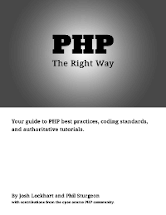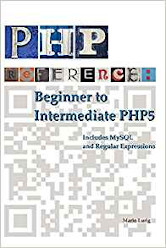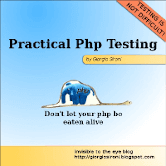Last Updated on June 14, 2023
PHP has been at the helm of the web for many years. It is an extremely popular, interpreted scripting language that is ideally suited for web development in part because it has an approachable syntax and supports different operating systems. This language powers millions of web sites on the net and is extremely well supported by its user community.
PHP is also used as a general-purpose programming language. PHP code can be executed with a command-line interface (CLI) and to implement standalone graphical applications. CLI PHP programs often automate common tasks such as testing, deployment, and application administration. The language offers a very complete set of object-oriented programming features as well as support for functional programming. The latest TIOBE Index (August 2019 at time of writing) ranks PHP in 8th place, behind Java, C, C++, C#, Python, Visual Basic .NET, and JavaScript.
The language is released under a non-copyleft free software license / open source license. The latest stable version adds lots of new features.
1. PHP: The Right Way by Josh Lockhart, Phil Sturgeon
 PHP: The Right Way is an easy-to-read, quick reference for PHP best practices, accepted coding standards, and links to authoritative tutorials around the Web. It aims to introduce new developers to some topics which they may not discover until it’s too late, and seeks to give seasoned developers some fresh ideas.
PHP: The Right Way is an easy-to-read, quick reference for PHP best practices, accepted coding standards, and links to authoritative tutorials around the Web. It aims to introduce new developers to some topics which they may not discover until it’s too late, and seeks to give seasoned developers some fresh ideas.
Topics covered include coding practices, dependency injection, databases, templating, errors and exceptions, security, testing, virtualization and more.
The book has been translated into German, Spanish, French, Italian, Polish, and many other languages.
The book is released under the Creative Commons Attribution-NonCommercial-ShareAlike 3.0 Unported (CC BY-NC-SA 3.0) license. It is available to read online, and in PDF, EPUB and MOBI formats.
2. PHP Reference: Beginner to Intermediate PHP5 by Mario Lurig
 PHP Reference Book: Beginner to Intermediate PHP5 is a collection of over 250 PHP functions with clear explanations in language anyone can understand, followed with as many examples as it takes to understand what the function does and how it works. One of the best books to keep around as a PHP reference.
PHP Reference Book: Beginner to Intermediate PHP5 is a collection of over 250 PHP functions with clear explanations in language anyone can understand, followed with as many examples as it takes to understand what the function does and how it works. One of the best books to keep around as a PHP reference.
This PHP reference includes numerous additional tips, the basics of PHP, MySQL query examples, regular expressions syntax, and two indexes to help you find information faster: a common language index and a function index.
Topics include:
- Operators
- Control Structures
- Global Variables
- Variable Functions
- String Functions
- Array Functions
- Date/Time Functions
- Mathematical Functions
- MySQL Functions
- Directory & File System Functions
- Output Control (Output Buffer)
- Sessions
- Regular Expressions
This book is licensed under the Creative Commons Attribution-NonCommercial-ShareAlike 2.0 License.
3. Practical PHP Testing by Giorgio Sironi
 This practical testing book is aimed at PHP developers and features articles from the author’s Practical PHP testing series.
This practical testing book is aimed at PHP developers and features articles from the author’s Practical PHP testing series.
It also includes a chapter on TDD theory, code samples, and sets of exercises.
This book is licensed under a Creative Commons Attribution-Noncommercial-Share Alike 3.0 United States License.
Next page: Page 2 – PHP 5 Power Programming and more
Pages in this article:
Page 1 – PHP: The Right Way and more books
Page 2 – PHP 5 Power Programming and more
Page 3 – PHP Pandas and more
All books in this series:
| Free Programming Books | |
|---|---|
| Ada | ALGOL-like programming language, extended from Pascal and other languages |
| Agda | Dependently typed functional language based on intuitionistic Type Theory |
| Arduino | Inexpensive, flexible, open source microcontroller platform |
| Assembly | As close to writing machine code without writing in pure hexadecimal |
| Awk | Versatile language designed for pattern scanning and processing language |
| Bash | Shell and command language; popular both as a shell and a scripting language |
| BASIC | Beginner’s All-purpose Symbolic Instruction Code |
| C | General-purpose, procedural, portable, high-level language |
| C++ | General-purpose, portable, free-form, multi-paradigm language |
| C# | Combines the power and flexibility of C++ with the simplicity of Visual Basic |
| Clojure | Dialect of the Lisp programming language |
| ClojureScript | Compiler for Clojure that targets JavaScript |
| COBOL | Common Business-Oriented Language |
| CoffeeScript | Transcompiles into JavaScript inspired by Ruby, Python and Haskell |
| Coq | Dependently typed language similar to Agda, Idris, F* and others |
| Crystal | General-purpose, concurrent, multi-paradigm, object-oriented language |
| CSS | CSS (Cascading Style Sheets) specifies a web page’s appearance |
| D | General-purpose systems programming language with a C-like syntax |
| Dart | Client-optimized language for fast apps on multiple platforms |
| Dylan | Multi-paradigm language supporting functional and object-oriented coding |
| ECMAScript | Best known as the language embedded in web browsers |
| Eiffel | Object-oriented language designed by Bertrand Meyer |
| Elixir | Relatively new functional language running on the Erlang virtual machine |
| Erlang | General-purpose, concurrent, declarative, functional language |
| F# | Uses functional, imperative, and object-oriented programming methods |
| Factor | Dynamic stack-based programming language |
| Forth | Imperative stack-based programming language |
| Fortran | The first high-level language, using the first compiler |
| Go | Compiled, statically typed programming language |
| Groovy | Powerful, optionally typed and dynamic language |
| Haskell | Standardized, general-purpose, polymorphically, statically typed language |
| HTML | HyperText Markup Language |
| Icon | Wide variety of features for processing and presenting symbolic data |
| J | Array programming language based primarily on APL |
| Java | General-purpose, concurrent, class-based, object-oriented, high-level language |
| JavaScript | Interpreted, prototype-based, scripting language |
| Julia | High-level, high-performance language for technical computing |
| Kotlin | More modern version of Java |
| LabVIEW | Designed to enable domain experts to build power systems quickly |
| LaTeX | Professional document preparation system and document markup language |
| Lisp | Unique features - excellent to study programming constructs |
| Logo | Dialect of Lisp that features interactivity, modularity, extensibility |
| Lua | Designed as an embeddable scripting language |
| Markdown | Plain text formatting syntax designed to be easy-to-read and easy-to-write |
| Objective-C | Object-oriented language that adds Smalltalk-style messaging to C |
| OCaml | The main implementation of the Caml language |
| Pascal | Imperative and procedural language designed in the late 1960s |
| Perl | High-level, general-purpose, interpreted, scripting, dynamic language |
| PHP | PHP has been at the helm of the web for many years |
| PostScript | Interpreted, stack-based and Turing complete language |
| Prolog | A general purpose, declarative, logic programming language |
| PureScript | Small strongly, statically typed language compiling to JavaScript |
| Python | General-purpose, structured, powerful language |
| QML | Hierarchical declarative language for user interface layout - JSON-like syntax |
| R | De facto standard among statisticians and data analysts |
| Racket | General-purpose, object-oriented, multi-paradigm, functional language |
| Raku | Member of the Perl family of programming languages |
| Ruby | General purpose, scripting, structured, flexible, fully object-oriented language |
| Rust | Ideal for systems, embedded, and other performance critical code |
| Scala | Modern, object-functional, multi-paradigm, Java-based language |
| Scheme | A general-purpose, functional language descended from Lisp and Algol |
| Scratch | Visual programming language designed for 8-16 year-old children |
| SQL | Access and manipulate data held in a relational database management system |
| Standard ML | General-purpose functional language characterized as "Lisp with types" |
| Swift | Powerful and intuitive general-purpose programming language |
| Tcl | Dynamic language based on concepts of Lisp, C, and Unix shells |
| TeX | Markup and programming language - create professional quality typeset text |
| TypeScript | Strict syntactical superset of JavaScript adding optional static typing |
| Vala | Object-oriented language, syntactically similar to C# |
| VHDL | Hardware description language used in electronic design automation |
| VimL | Powerful scripting language of the Vim editor |
| XML | Rules for defining semantic tags describing structure ad meaning |

